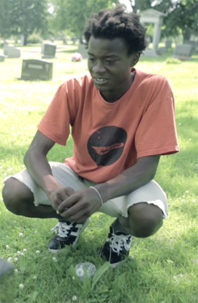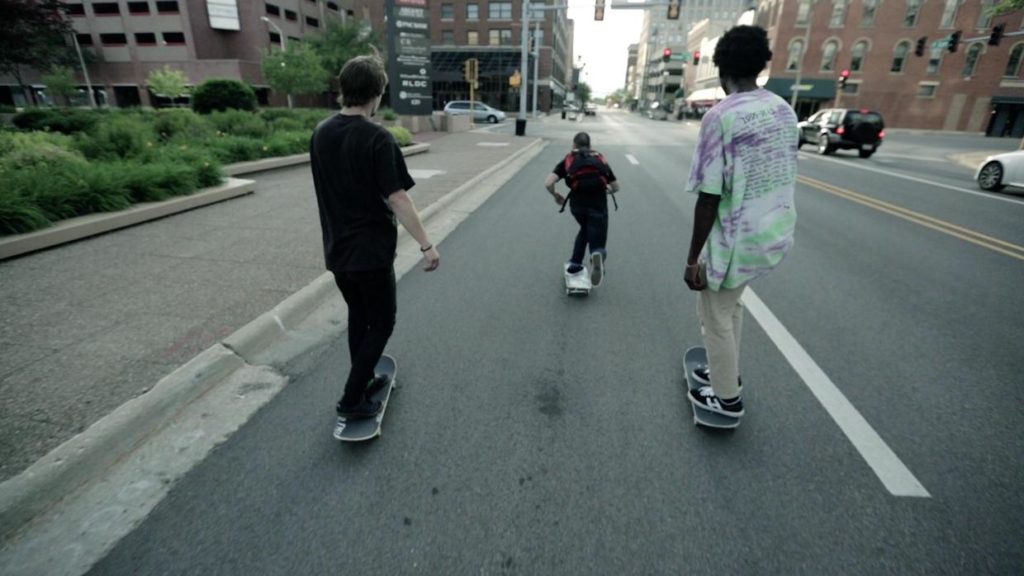
Minding the Gap finds a deep beauty in its three skater protagonists. We can see that as the camera glides while following them as they ride their skateboards. The seemingly empty streets of Rockford, Illinois are theirs to explore. And yes, the occasional drunken antics of three young men would otherwise cause people to roll their eyes. However, this documentary finds joy in the claustrophobic rooms of the house where those things happen. But of course, this movie analyzes what’s really behind their otherwise infection laughter.
This is also a part of a very good trend in recent documentaries. Ones that examine the class dynamics of his subjects. It helps show this through a protagonist and one of director Bing Liu’s best friends Zack Mulligan. Mulligan using two by fours to create a skate park indoors. This reinforces another attempt to legitimize skateboarding, which older people still deride. Mulligan understandably wants to make money out of the sport he and his friends are diligently practicing. And he does this while using his dad’s carpentry skills.
But the best way to legitimize skateboarding is to just show it. Liu captures the third protagonist and his other best friend Kiere Johnson skating through a park. There’s skill here, through his floating camera he depicts Kiere quickly and easily going from one trick to another. These scenes end in a harmless fall. Kiere just laughs when this happens while his eleven year old self would just be angry. In a way, that encapsulates two of the different ways to react through pain and failure.
Making a dream out of what some consider as a hobby is difficult enough as it is. Minding the Gap reveals Zack’s park as a bust just like the one his father tried to build. He narrates that his dad’s park failed because of a waning interest in skateboarding. It shows the squalor that that park turns into, which eventually echoes what happens in his home. What happened to his park happened because of personal dealings and luck. But there’s a sense here that his failure is part of a macro trend.
Nonetheless, Liu’s cameras were always rolling. The movie probably started out to capture the times when his friends got their tricks wrong or right. This became more than that. Liu turns the camera on himself doing the same things, or just him in his room looking sad. He weaves together footage from different years. He then accompanies those visuals with his friends narrating. Telling him what they know of what he went through when he was younger. This is a potent self-examination of three young men.
This doesn’t just capture the streets or the parks where Lui and his friends skate. It also goes into the uncomfortable moments of his and his friends’ domestic lives. He asks Kiere’s mom Roberta personal questions and there’s a unfolding dynamic in that scene. She’s happy about the questions. Then there’s another man behind the camera who want to shut that conversation down. This becomes a theme here. Liu watches the women he knows enduring and escaping the men gas-lighting and psychologically abusing them.
It’s a strange elevator pitch – this is a film about skateboarding and domestic abuse. And as cheesy as this sounds, those two topics are integral to the lives of these men. In making this film Liu weaves those two topics with sensitivity. It’s a quality he needs in telling the story about him, his mother Mengyue Bolen, and his abusive stepfather. There’s also something haunting about how he captures Rockford’s almost empty streets and highways. That these are the places where the cycle of abuse and escape happen.
One of the most interesting manifestation of the dysfunctional home life happens to Zack. The doc shows this both through interviews and by just following his around. He’s a victim of domestic abuse too. But he grows up using macho language prevalent in his home life and in skateboarding culture. Language he uses on his on and off girlfriend Nina Bowgren. The doc then asks the question of what happens when a best friend embodies the antithesis of your moral values.
Aside from raising these important issues in the lives of his fellow skaters, Liu makes some conscious visual decisions. His use of background, his close-ups on Kiere and Zack and himself. All of this help him earn the emotional weight of Zack’s teary confessions. Time passes, and these three protagonists turned from teenagers to fathers and uncles. And there’s a weariness in realizing the arrival of generations here. Weariness disguising itself as false hope. That they can’t escape because some of us tried to and failed.
- Release Date: 9/28/2018


